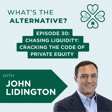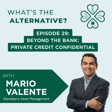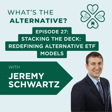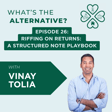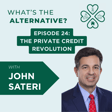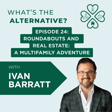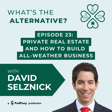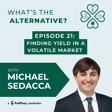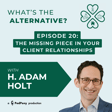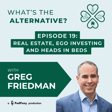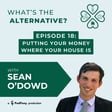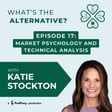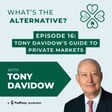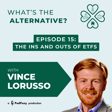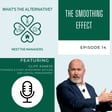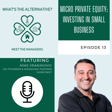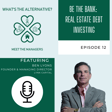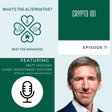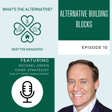Become a Creator today!Start creating today - Share your story with the world!
Start for free
00:00:00
00:00:01

What’s the Alternative? | Episode 22 | From Advisor to VC: How AI and Access Are Reshaping Venture Capital with Brad Zapp
In this episode, Brad Zapp, co-founder of Connetic Ventures, shares how he left wealth management to pioneer AI-powered founder analysis and launch one of the first advisor-accessible venture capital interval funds. We dive into his journey building Wendell, an AI “psychologist” that quantifies founder traits, and why making private markets more accessible isn’t just innovation—it’s a necessity. For any advisor looking to bridge the public-private gap without sacrificing ease or scale, this episode delivers a bold new blueprint.
Key takeaways:
- AI can quantify founder psychology and improve early-stage investment decisions.
- Interval fund structures remove barriers for advisors and their mass affluent clients.
- Access to private markets is essential as companies stay private longer and public markets shrink.
Connect with us!
Transcript
Introduction to 'What's the Alternative?' Podcast
00:00:00
Speaker
And I was convinced about the macroeconomic, you know, functioning, you know, of the markets, which has continued to this day. I mean, it's something that is really important ah to look at from a forward looking, you know, expectations.
00:00:14
Speaker
and their go
00:00:19
Speaker
Welcome to Bonnarooin Capital Management's What's the Alternative podcast. Join host Shana Orzek Sissel, the queen of alternatives and founder, CEO of Bonnarooin Capital Management, as she interviews leaders in the alternative investment space.
Guest Introduction: Brad Zapp
00:00:37
Speaker
Learn more about their firms, their passions, and about the many different ways investors can use alternative investments to add value in their investment portfolios.
00:00:51
Speaker
Hello everyone. My name is Shayna Orzak-Sysel and I am the founder and CEO of Banrian Capital Management. And this is What's the Alternative?
00:01:03
Speaker
Today we have, think we say this every time in the intro um and it's never not true, but i guess it's cliche. We have a very special guest. um Today we have Brad Zapp with us and Brad's special for a lot of reasons.
00:01:17
Speaker
ah Number one, um Brad and Kinetic Ventures are not only a partner on the platform, but an investor in Bonruin itself.
Brad's Journey from Financial Advisor to Venture Capitalist
00:01:26
Speaker
ah So if you love Bonruin and you love what we're doing and you want to like kind of invest in us so you can invest in Kinetics Fund and subsequently get some exposure to us.
00:01:39
Speaker
ah With that said, the thing that makes Kinetics so different is that Brad's journey and Brad's story is really unique. And I think ah the advisors in our audience will really appreciate it. So without further welcome, Brad.
00:01:54
Speaker
Thanks, Shana. Really appreciate being here. No problem. I'm really glad that we finally got you on. You've been with us for a long time, but and we know we've been working on some things behind the scenes um and we'll get to talking about that as we kind of go on. But why don't you tell our audience a little bit about your background and sort of how you got into the finance industry and then your path and my path are similar. And I'd love for you to share with our audience kind of how you progress because it's an unusual path, to say the least.
00:02:26
Speaker
Yeah, so I'll start with where I'm at today and then kind of backtrack because I don't think this is the traditional way that you would end up here. But, you know, today I'm the you know co-founder and president of a venture capital firm.
00:02:41
Speaker
I didn't start out in the private markets. I didn't start out in investment banking, private equity venture. I've never been on the coast or anything like that. I actually started out as a financial advisor.
00:02:53
Speaker
a very traditional RIA, and I ended up um finding my way here, and which is, if you want to put a little extra wrinkle into that, I'm also from the greater Cincinnati area, which is a great area, but nothing typically unique or forward thinking you know starts out of that area. So it would be weird for an advisor um and I had good success, you know, to sort of leave that industry and, you know, go to the portfolio you know management side. But the thing of it is, you know, I was an advisor.
00:03:28
Speaker
It's in a very, very different time. And so when I started in the industry first as a broker 2000 to and then as a r ia from two thousand four to two thousand and thirteen If you you know go in the history books and you look at the markets, the capital markets during that time, was terrible.
00:03:50
Speaker
I mean, it was terrible. Like everything that I learned in you know college um or from my mentors, nothing worked. You know, first I go through you know the dot com bus. My first literally the market went down from the day I stepped foot you know on a trading floor.
00:04:05
Speaker
um And then as soon as I got my breath back in late 03, you know, by 07, you know, with the real estate pullback and the Great Recession, things, you know, started to started up to pull again. So it wasn't a fun time to be a financial advisor. would call it an exhausting time.
00:04:24
Speaker
The benefit to that, you know, for me as a real I was very young then is I had to cut my teeth in live fire on, you know, low correlation and and really, you know, diversifying strategies and, that you know, but the the you know, topic du jour these days is you'll hear either private market, secondaries or alternatives would be like the three slangs.
00:04:46
Speaker
And everyone's all into this. But that was vital to my success. It was vital. Forget success. It was vital to my survival. i wasn't going to have a business, um you know, during during those time periods. But The thing of it is they're not easy for an advisor to allocate across my entire book of business.
Digital Venture Capital and AI Innovations
00:05:08
Speaker
And so when you're, you know, financial advisors have to consider their clients' needs, but they also have to consider their, as a business owner, you know, the business needs of my practice. And it's not like I could just go out and press a button, like, oh, here's the easy button, you know like Staples, and just allocate, you know, to private equity or something like that for my entire client base.
00:05:29
Speaker
um So to put it in perspective, I feel like we were I was a very typical advisor. I think a lot of advisors out there will resonate with the size of practice I had. We were like, you know, three, maybe 400 million. We had about 450 households. I had about 1800 accounts.
00:05:45
Speaker
So a nice chunky size, you know, for the time period. And so you needed things that were were scalable. We we specialized, you know, in the small business owner clientele.
00:05:58
Speaker
um Some are accredited, some are not accredited, you know, all were affluent. And so, again, it was very difficult. It wasn't as simple as me deciding, oh, you know, I think some of these commodity strategies are really good or, you know, I think this, you know, um tech and venture capital is pretty good. We would be aware of plenty of these strategies, but there wasn't a product um that I could put in everyone's client. And so at the end of my tenure as an advisor, you know, the exhaustion, you know, basically was five to 10% of my practice thought I was brilliant because I did allocate them appropriately to lots of diversifying strategies. And they did notice a difference in their portfolio. And I got more credit than I deserved.
00:06:40
Speaker
But 80 90% my book of business You know, they didn't think I was any different than any other advisor out there because their their money just flowed, you know, with the ebbs and flows of the capital markets.
00:06:53
Speaker
But there was there was nothing I could do. And so I was just sort of hell bent. I was just, you know, at the end of that, I was like, it shouldn't be this way, whether that's from a regulatory standpoint, business model standpoint.
00:07:06
Speaker
There has to be some tools that we could put inside of our models. And so I really wanted to build you know, some some sort of product. And that would be hard to do from, you know, at the time, from a compliance standpoint inside my firm.
00:07:20
Speaker
So I told my partners, I said, I love you, and but I'm tired and I want to go build something. You know how you feel about buying me out. Let me do it. And they're wonderful partners. The firm's even bigger. Maybe I was dead weight. The firm is even bigger now than it was then.
00:07:34
Speaker
um So they bought me out. And um then I started my journey towards building what we have today. So it's so funny listening to you tell your story because it's not all that dissimilar from my own.
00:07:45
Speaker
So I started in the business as a broker at Morgan Stanley, 2001-ish, early 01, late 2000.
00:07:58
Speaker
um ah Same thing. i used to joke that I don't, all these advisors have been like through the ninety s and the late eighty s They what does the bull market look like, please?
00:08:08
Speaker
like i have no idea um because I never experienced one until we got out of the financial crisis. And now we got a whole generation that knows nothing but. And it it's weird to me to think that, like, if you think about that, 2011 14 years ago.
00:08:25
Speaker
so you know the average late 30s advisor, that's all they know. And and for you and i our entire beginning of our career was different. And so we think different and same exact thing is I ended up leaving that job because as you put it, you were tired. In my case, I was like, that's God's work. And I just don't have the personality to be able to be people's therapists.
00:08:52
Speaker
And because it's exhausting, mean you're constantly having to like reassure your clients that you're doing the right thing and to work really hard to keep them on a path. And as you know, unless you're an ah RAA, um you don't have discretion and you can't necessarily keep them from doing um the wrong thing.
00:09:11
Speaker
um and even if you can, they they'll leave you in a heartbeat if you push too hard. So it's a fine line. And so just like you, same thing. And I got exposed to alts by taking a job doing institutional allocations the space had the exact same vibe um and feeling of it and then really got into like the 40x stuff and i think that's a good segue into you know kind of where kinetic came to be um how it kind of came to fruition how it's different um and actually you know the reason you and i like really
00:09:43
Speaker
it felt like we really understood each other from the first conversation. And I think you were so interested in what Von Roon was doing is because you and I were looking to solve basically the same problem.
00:09:54
Speaker
So tell us a little bit about Kinetic because every time I talk to advisors in Cincinnati, they all know who you are and they're all investors. So we want advisors outside of the greater Cincinnati area to know all about Kinetic.
00:10:07
Speaker
and um And I think that um it would be great to hear kind of how Kinetic came to be and how what you're doing is in a way um colored by your early experience as an advisor.
00:10:21
Speaker
It's for sure. So when when I knew I wanted to build something, you know, some sort of solution, you know, I really had ah didn't have my clients in mind so much as I had the advisors in mind. I mean, that sort of anxiety, um you know, that I went through, i I know was felt by tons of advisors that washed out, you know, during that, you know, during that time period. And I thought, yeah you know, we could we could do something and, and you know, build something, you know, that would help them, you know, in their businesses and ultimately, you know, help help their clients. I wasn't, it's not like I knew that I was going to do venture capital ah at that time. In fact, I was looking at a lot more like real asset, you know, type stuff. And the reason is,
00:11:06
Speaker
again, being from greater Cincinnati, ah the one asset class we really didn't have anyone near us that, um you know, could teach me was venture capital. i mean, that was a very coastal thing.
00:11:19
Speaker
i had heard about it. um You know, is I knew is uniquely different from private equity, but I wasn't even i really probably didn't even consider that as an asset class. It wasn't it wasn't something that was real. Right. There wasn't even a private not of substance or wasn't a private fund that was around like trying to to get our money personally put our um clients money in it. But probably around 2011 or 12, 2011, you know, the world sort of changed.
00:11:49
Speaker
I think, you know, Y Combinator out in the valley really sort of set that that wave of accelerators that just blew across the nation. And, you know, all of a sudden you had 500 accelerate, you know, every town had an accelerator, right? and if you were if you were a tech hub, you had an accelerator and but it did a great job of.
00:12:08
Speaker
um So we had like three pop up within a two year span ah northern Kentucky and greater Cincinnati. And I got to say, it did a great job of creating that vibe, that energy. And I didn't know what it was. I didn't I really struggled. Is this philanthropy?
00:12:23
Speaker
Is this investing, you know, coming from very serious, you know, our world. And i I sort of like dove all in to solve this riddle in my head. and it was kind of like, and does anyone make money at this?
00:12:37
Speaker
And if they do, why is this not a part of every advisor's portfolio? And it was really just community driven in my mind. And I kind of you know became involved and personally invested in all these different things. And that's when I decided man, I think this like could be like the next you know the next decade, you know really important you know way to invest because there's a fundamental change that was happening in the markets that I think a lot of advisors don't know about today. And I think it's really important when you think about asset allocation to understand this, and this was all happening during this time, is our economy was roaring.
00:13:17
Speaker
Right. It was doing really well. it was growing, you know, from the time I left to today, you know, might be up 50 percent or something like that. But at the same time, about 50 percent of the public companies went away.
00:13:29
Speaker
hmm. That's weird, right? Like that's weird during during a good time. And what was happening was the success of the venture capital industry with all the fundraisings and financings happening in the in the private markets was really front running, you know, the need you know to do this IPO.
00:13:47
Speaker
So like commingle all that together, i was like, this is this is what I want to do. I think this is the next 30, 40, 50 years. This is the future. i think this is a wave. These private markets um or are much larger than, you know, by by count of security, much larger than the public markets.
00:14:06
Speaker
And so I set out um to build a you know security or a product that I could take back and I could sell to all my friends. And my I didn't know what I was doing. Like I said, in my my sales pitch for our first fund, which was like an angel fund,
AI in Assessing Startup Founders
00:14:20
Speaker
because I didn't know any different.
00:14:21
Speaker
It was terrible. i I literally went out to 50 of my best friends and I said, I have no idea what I'm doing. But I really think this is a good idea. I'll work at it full time and we'll figure it out.
00:14:33
Speaker
And so that's kind of what we did. And and it was very regional at the time. It was very the tri-state, you know, localized stuff, because you would hear these angel groups talk about how wonderful their deal flow and their and their stuff is. Well, that went about as well as you can imagine. Not good at all. Yeah.
00:14:52
Speaker
Turns out there's not enough deals in a hyper local way to build an institutional portfolio. So we just we just kind of kept at it. Again, I was convinced about the macroeconomic, you know, functioning you know of the markets, which has continued to this day.
00:15:08
Speaker
I mean, it's something that is really important ah to look at from a forward looking, you know, expectations of public markets versus private markets. So we were convinced.
00:15:20
Speaker
um And so we just kept at it. And the thing of it was, you know, we had two choices when we looked at the data. Choice number one, if I really wanted to do something in a localized way, i needed to move to the coast.
00:15:34
Speaker
Right. I needed to either some way raise a billion dollars myself or I needed to hitch my wagon to as an existing successful B.C. if that's what I wanted to do, because they do have enough deal flow on, on you know, to two particular regions in the U.S.,
00:15:49
Speaker
But see, I had kids. I was anchored. right I had kids in school. This wasn't going to happen. I couldn't move. So the second option was, well, if I can't compete sort of in that retail model of the Valley or Boston, New York,
00:16:03
Speaker
Where are all the rest of the deals? The good news is I found them. The bad news is I needed rest of country. I'm talking everything. You couldn't just do you know, Cincinnati, Indianapolis and Louisville.
00:16:16
Speaker
I mean, you needed Canada, Mexico and the entirety of North America. And I don't know how. broad of a landmass that is 10 million square miles or something ridiculous.
00:16:27
Speaker
But so I found the opportunities if you really wanted to build an institutional portfolio. But I couldn't get to them. Right. They couldn't get to me. I couldn't find them.
00:16:38
Speaker
And we made an insane decision ah probably about 2018 was we became the nation's first digital VC. And this is pre-COVID, pre-Zoom, pre-Microsoft Teams, all this stuff.
00:16:51
Speaker
We just said, you know what? The only way that we can cover that level and ah and eventually sort of drive deals is we needed to like set up a bot program, put it in the cloud and have it talk to founders.
00:17:05
Speaker
And again, that went about as well as you'd think. Not good. Because nobody, you know, everybody was taught. you've You've heard this, and I don't mean to, like, make fun anyone, but the idea was founders were taught to get a warm introduction, right, to me.
00:17:20
Speaker
And it was probably frustrating for a couple, you know, founders that were well-coached and well-connected that they couldn't just, they could. I just told them to go talk to my bot, named Wendell, you know, in the cloud.
00:17:33
Speaker
And the benefit was everyone had to talk to Wendell, but everyone got to talk to Wendell. But it just wasn't it wasn't a thing. I mean, people weren't ready for a digital solution. I knew something. I knew we were going to have a digital revolution at some point in America. i just didn't know what it was.
00:17:49
Speaker
And of course, we all know what it was now. It was COVID. And 2020, you know, For all the political drama and all the health drama and all that stuff, that aside from a business standpoint, it changed my life.
00:18:03
Speaker
And to put it in like numeric perspectives, you know, we might have been lucky to get 14 or 15 opportunities a month, which is, again, you can't build a portfolio. In April of COVID, we had like 142. Wow.
00:18:16
Speaker
wow because we were open for business. right And the retail model was closed for business. And you know fast forward to this day, i mean, look, you and I were doing a podcast virtually. I mean, 50 to 70% of my meetings you know are virtually, sometimes even when they're in the same town.
00:18:33
Speaker
And so digital revolution was on. And we had built this chassis that could you know capitalize you know on that. And I knew that would cut my cost.
00:18:44
Speaker
drastically from creating deal flow. And from that moment on, we started marching towards a product that was more suitable um for distribution through advisors, which is where we are today, um you know, with with something that that works.
00:19:00
Speaker
It's kind of crazy if you think about it, um as you're telling that story and saying like COVID and the digital revolution and us doing this via Zoom, I can't but think that wasn't that long ago But you're right, that there was a ah complete and total, very fast cultural shift that all of a sudden, if you were recall before that, the work from home thing was like, oh my God, if you worked from home, you were judged.
00:19:28
Speaker
They were like, you're not really working. And it was like the biggest judgment in the world. And kind like you, I had an opportunity early on before it was a thing to kind of see what that looked like if it was going to happen on a mass scale.
00:19:45
Speaker
I lived in Boston. um during the winter of 2015 which is when they got
Impact of Remote Work on Investments
00:19:50
Speaker
like 10 and a half feet of snow in six weeks um and it it it actually broke the public transit system and so for like a month the the metro uh the um the um t um the commuter rail lines didn't work and neither did some of the subway systems and the city of boston basically said to all the companies in the city we don't have enough parking spots
00:20:16
Speaker
to be able to support everybody having to commute in by vehicle. our Our roadways, are ah the traffic's bad enough with the commuter rail and with the subways working,
00:20:29
Speaker
Nicole Brown- Nobody would be able to get in the city to take hours, so they said everybody needs to work from home Brown- So for a month I had to work from home um until everything got back up and running and then after that it was like body because they weren't running normal schedules so like at fidelity, we had a group that would come in.
00:20:49
Speaker
a little early, but then they would leave at like two because they only had trains that ran at like certain increments. And so it was like COVID, but before COVID. um And so I had an inkling of like, wow, this is actually cool.
00:21:03
Speaker
I like working from home. I can be more productive and I can do other stuff. um And to your point, um one of the things you were on the cutting edge of and you didn't say it, but Wendell's kind of AI before AI was cool.
00:21:19
Speaker
I call it 10 man AI. mean, yeah it's so funny because now you could have a banana that's artificially intelligent, right? If you don't put dot AI after something, no one seems to care about it. But when we did it and if I use those words, I would get and we actually were using and are using AI, you know, back then it was machine learning, which is why i call it 10 man AI because machine learning is from the 70s.
00:21:44
Speaker
And they were like total fraud. No way. You know, AI is not a thing. Just like digital wasn't a thing and then it was, and then a AI wasn't a thing and now it is. And of course, our AI enhancements because of the different LLM models are radically better than they were when we first concocted this thing. But what luck.
00:22:04
Speaker
did i get because we had a digital tech chassis that was collecting all this data for all these years and then you get ai in the last you know three years where you can sort of like wow i have this proprietary data let's see what it does and you actually had something to feed it so we can do when we are doing a lot more interesting things today and we have a good roadmap um for the future but All this was blind luck. It was basically every door was shut in my face, right? out You know, it's like the hyperlocal model wouldn't work.
00:22:35
Speaker
No, I'm not going to move. um We're going to go to the cloud. Nobody cared about the cloud. COVID hits. Everyone cares about digital. And boom, here we are. Yeah, I swear. It's like we were on parallel paths because all of it kind of was happening around the same time for both of us.
00:22:53
Speaker
um is it's So when and want our audience to kind of understand how Wendell works because when we were introduced, is in 2023, was introduced because you were... um i was introduced because you were you had Wendell and you were trying to and thinking about building out um around Wendell.
00:23:13
Speaker
And um as you talked to in your team, talk to us, we're like, why don't you put your deck in Wendell? And, you know, we aren't the traditional kind of polished um founders. um In fact, purposefully so.
00:23:30
Speaker
But that means that, like, we make traditional venture capital very uncomfortable. um being female led, the way that we present ourselves to the world and the way that we're basically taking on some really big players in the industry and saying, no, they're doing it wrong and we can win.
00:23:50
Speaker
i think a lot of traditional VCs like these this woman is crazy. I don't think she's that smart because that's they just look at me and immediately think that I can possibly have a brain.
00:24:02
Speaker
And so they kind of write us off. But when we put all of our stuff in Wendell, Wendell was like, no, this a good investment. it like It was validating for me because I was like, I know I'm on the right path.
00:24:14
Speaker
So as a founder, it was actually like something that made me feel like, OK, we're on to something, even if like even with the judgment, even people don't get it And now I like to tell people that Kinetic, and I think this is true, and correct me if I'm wrong, you really were the first AI-driven venture capital fund in the industry.
00:24:34
Speaker
I believe that to be true. I think there is probably one or two articles I've read over the years of people that, and i you know, I know there's some there's a big tech company, very famous out in the valley that was doing some things.
00:24:48
Speaker
I think they had some they had some struggles with their models. have a theory on why. um so we we sort of took a a weird um tactic so if you think of you know traditional venture firms that are doing stuff the growth stage ventures like all the rage right everyone talks about that series a and i think one of the reasons and it makes sense is by the time you get to you know you've you've been you know two three four five six years old you've got some you know, easily identifiable KPIs, financials. That's that's like that's hard data, right? That's structured data that people can wrap their heads around.
00:25:28
Speaker
And there's certain metrics that, you know, those VCs could plug in and they say, wow, you know, that looks like that they've really figured it out. i'll just pour some growth capital. But the thing of it is I was more fascinated with, again, this was just because where could I compete? I couldn't compete with those, you know, those firms at that level. I really needed to front run those trades and I needed to get, you know, shares in these solid companies, you know, before they reach that growth stage, which is going to be popular with founders anyways, because, as you know, that's the hardest precedence seed is the hardest fundraiser you'll ever go through.
00:26:05
Speaker
ah But you don't have any of those metrics and no company has those metrics at those stages. And so what possibly could I measure? And to me, it was super obvious, regardless of how challenging, because everyone says it out of their mouth.
00:26:19
Speaker
You know what? The founder, co-founder and the early team is the most important thing. Team, team, team, team, team. I'd bet on the A team and a B, whatever. We could go down all the, you know, isms and at one way or the other, whether it's the most important, the second most important or third most important, it's almost unanimous that when you're an early stage product company,
00:26:43
Speaker
Team is crazy important. and But I was wondering at all these different angel groups and all these different things that I personally invested in, why was no one measuring this? If it was so important, you're telling me that it's impossible for me to assess Whether Shayna or Brad or anyone listening has got high potential.
00:27:05
Speaker
I don't think that's impossible because they do it in other industries. They do it in athletics. I mean, they do it in the NFL. They do it in the NBA. You do it at NASA, the FBI. people matter so we sort of went out in the world and i guess psychologists just aren't investors they don't make enough money and that's why they never part of the conversation so we just started you know calling psychology departments at different universities i talked to tons of them we read tons of books we took many different assessments and And the weakness of all the ones that were available in the world was sort of their validation process because they were they were based off like general population or they were based off college-educated general population. But I'll tell you something about –
00:27:49
Speaker
founders and entrepreneurs. We ain't normal. And I really needed a data set up. I was going to do some sort of psychological experiment. I really needed it to be ah comparative analysis of this very super special set of humans doesn't exist.
00:28:08
Speaker
So we just sort of took the knowledge that we had on how to build, you know, what's really most people don't know about psychology. It's a mathematical science. um And so we built proprietary assessments from the ground up.
00:28:22
Speaker
And so Wendell's superpower is he's an AI psychologist. And Wendell delivers these proprietary assessments and tries to tease out, you know, a couple of concepts. a lot of times we call them soft skills, but we take the soft skills, we turn them into hard data and it just it's supposed to cut through the crap, like no matter what appearance you put on.
00:28:43
Speaker
You know, let's you're over the top. I'm a little weird. And that creates biases, which is what you're talking about. But let's cut through that crap. Let's get right to the heart, or right to the soul of who are you as a human?
00:28:53
Speaker
You know, who's your early team members? Can you even do this? Will you enjoy doing this? Because... These things are important. The human, we are more capable of anything.
00:29:05
Speaker
But if you don't like it, you're going to burn out. Burnout is probably the largest problem in Midwest founders, right? It's harder than they thought. Fundraising sucks. They don't want to pivot. It's just, you know, so we cut through that.
00:29:18
Speaker
We take all these theoretical soft skills. We turn it into hard number crunching data. And when I look at founders through our system, I just see ones and zeros. I don't see you. i had no idea.
00:29:29
Speaker
Sort of like your persona or anything like that. You know just were compared to all the other founders in our system that were already either successful or not successful.
00:29:43
Speaker
And we're just trying to get an edge, you know. And so we believe that highly gifted people that are suited for venture backed startups have an edge over the average person. And if I build a portfolio,
00:29:55
Speaker
of special people, we're gonna make money and we build an entire business off it. I love that. I tell people all the time that I don't understand why they wouldn't want to invest in me. Like,
00:30:06
Speaker
if If you look at like my track record in life, um, like I'm, I'm the kind of person that like, doesn't give up. And I was watching a video on Instagram recently.
00:30:18
Speaker
um and Sam Altman, it was Sam Altman talking about how the key to being a really good founder is being determined and also slightly crazy enough to think that like, there's no way this isn't going to work. And somebody who just like, cannot be told no.
00:30:34
Speaker
um because the vast majority of people, to your point, will reach a point where they just burn out and they're just so they won't push through that with any sense of determination through to the other side when that moment hits them, when it just gets too hard.
00:30:50
Speaker
um And um in many ways, having your team has been really helpful because Now, there have been at least three times in the last 18 months that I've chat on the phone with your team and been like, ah it's so hard guys, help, I need help.
00:31:06
Speaker
And you guys are doing your thing, which we'll get to next. um And you were like, we can't help you right now. Like you just gotta to push through. If you can get to the other side, we'll be there with you. We will, I swear, just make it.
00:31:17
Speaker
and And I was like, all right. And I did. um And we continue to push through. it's like I'll figure it out. Like, I'll figure it out.
00:31:28
Speaker
I don't know what, but I'll figure it out. Cause I know it's a good idea. I know what we're doing. It makes a difference. And, and you know, the ability to kind of see that and see that through Wendell, because when we first did this, half the stuff that's happened hadn't happened. yeah You know, you, you wrote us a check in September of 2023, which is exactly when all of my problems started.
00:31:52
Speaker
um ah and in terms of my my health stuff that like bombed out the end of 2023 early 2024 But Wendell kind um but wendell kind of They're like predetermined that like if Shana faced X, he would be able to make it through. And that's why you were willing to do that.
00:32:12
Speaker
So I kind of want to. It's super key. I mean, think of that. It's like really in this world, you will have trouble. I mean, it's literally biblical. And if if you don't think that human behavior is predictable,
00:32:27
Speaker
um or if you don't think that your founders are not going to go under stress and duress, you're crazy. And so moral philosophy is let's just assume the worst and let's find people whose behaviors will respond in a way um that they can survive. And that's part of the key is just, you know, get through these first five or six years and um figure it out and you can have more success. And we've seen that to be true time and time again.
00:32:54
Speaker
Yeah. ah Humans are remarkably predictable yeah i say that all the time like it the ability for me to predict people's behavior has gotten so good over the years because i pay attention to markets and i i had to make decisions based on how i think people are going to react and and as a founder you have to learn how to read people really well because you're always pitching to different people and you got to know how to read your room really well if you want to be successful um and i with public speaking it's the same thing
00:33:25
Speaker
um But it's almost scary how predictable human behavior is. um The outliers are the most obvious ones, but most people are very easy to like figure out what they're gonna do next. And to your point, that can make it really easy for mathematics and stuff to predict it. Hell, half the stuff that's in the market these days is...
00:33:47
Speaker
is predicated on on human behavior um affecting market movements. And then the people who win, and the reason why there's so few, is the ones that can see that as the opportunity.
00:34:01
Speaker
um you know i did an interview yesterday with a Bloomberg reporter who was like, everybody's freaking out about the market. Do you think it's going to keep going down? and I was like, like I don't really look at it that way.
00:34:14
Speaker
Like Buffett says be greedy when others are fearful and fearful when others are greedy, but like mass most people can't actually do that. um And the ones who can win, that's why Warren Buffett is Warren Buffett. Like if everybody was able to take on that piece of advice, then There would be no opportunity for Warren Buffett to stand out.
00:34:33
Speaker
But the fact of the matter is most people can't do that. And that's why he wins. And I think that's just so powerful for what you're saying. So I want actually get into what I think is the most exciting thing of what you're doing. And and we're seeing this um come up more and more. But you guys were kind of at the forefront of this.
Introduction to Venture Capital Interval Funds
00:34:50
Speaker
And um I always like... and get excited helping the the first ones um we have something that i just came across my desk related to this in the sports right space that just got me all excited um but but in your case you were one of the very first venture capital firms like very first that was like we want to do an interval fund product um because interval funds weren't really a thing even three years ago Two years ago when, and when you, um, you made the choice to, to, to work with us, you know, interval funds, there might've been a hundred, maybe and the market. lady
00:35:28
Speaker
80. 80. Okay. 80. again, there was like none today it's closer to 300 and every day a new one's coming out, but you were like, I want to do an interval fund. And I thought, well, that's great. Um, and it took you a little longer than we had hoped, uh, because you know,
00:35:45
Speaker
when it's a newer product and newer players are coming into it, like you, um there's a learning curve. um and And so you had some learning that had to be done, but tell us a little bit about what made you want to launch the Interval Fund, um because I think our audience and the advisors in it are probably really excited about what you're doing right now. And they should be even more excited because it's pretty available to their clients.
00:36:14
Speaker
It is. So we spent a ah long time, you know, with, you know, lawyers and, you know, other, you know, asset managers, you know, truly, really understanding, you know, what what was available, you know, to us that would get me as close to the easy button for these advisors as possible. You know, I think overall,
00:36:38
Speaker
um you know we might have been the you know fourth or fifth um actual uh vc interval fund you know to launch i think you know there's been one or two that have struggled because they were i mean if you think i'm cutting edge there were a couple that were just a little too cutting edge and couldn't get distribution because of that i didn't want to do that interval funds have been around i mean forever but they've just never found a purpose particularly with americans obsession like with liquidity right and so For years, you know liquid alts and you know liquid open-ended funds was all the rage. But at the end of it, when you're doing derivatives or weird stuff, um it was proven in 08 that they didn't have the diversifying characteristics. So for me, I needed to, at my core, do prime you know we do primary financings. We are...
00:37:28
Speaker
as far as venture goes, we're as boring as you get. We buy stock and private companies all through North America. And that's kind of like all we do. We don't do anything weird. yeah We're buying stock and product companies, mostly tech. So I didn't want to ah didn't want to get away from that. And so the problem is I couldn't be an open ended mutual fund because I couldn't liquidate every single day, because no matter what legal jargon that you put inside this stuff, you are buying you know private securities that don't have an active market outside of secondaries, which is pretty small.
00:37:59
Speaker
And don't tell Apollo this, by the way. Yeah. So the Interval Fund, you know, is a chassis that um that I thought, you know, could really get as close to that as possible.
00:38:13
Speaker
And then, you know, also still be eligible for electronic trading because The electronic trading, getting you know, those networks that are the underbelly of, you know, particularly the industry that I know and care about, the independent um registered investment advisors.
00:38:31
Speaker
You know, I wanted to skip forward through that sub doc process and i didn't want closing on my fund to feel like a mortgage closing and and all that stuff. Again, being available for third-party asset management platforms or whether you do that externally, whether you're with an OCIO or whether you build your models in-house, nobody had ever built a product that was going to fit nicely in that.
00:38:57
Speaker
Everyone up until this point, when they think about alts, private markets or anything like that, they they're always talking about oh, you know, I got a couple of high net worths. I'm like, what about the rest of your book of the business?
00:39:09
Speaker
And so I really had this, if you're already have relationship, you're already doing, you know, so the best advisors are already have some awareness or some access to alternatives, including private equity, maybe venture capital.
00:39:24
Speaker
But I wanted the answer a much larger question, which is a much way, you know, there's a hundred and what 15 million non-accredited households that have iras in america what about them the mass affluent which i think is like this this i think the industry especially the larger players in private equity and venture capital and i'll say the thing that brad probably doesn't want to say because i'm i don't care um i think that the larger those those folks don't view that marketplace that market opportunity all that seriously beyond like
00:39:59
Speaker
the selling them subpar products because they just, they couldn't sell it to institutions. They got to put it somewhere. So let's see what we can do. And then they take the time to put it out to that market, but they don't really want to go through for, as they put it, small tickets.
00:40:18
Speaker
I don't want to deal with a small ticket. Because then I got to have 100 small tickets when I could just get one institution or really a wealthy person to write me one big ticket.
00:40:29
Speaker
Well, the one big ticket is a lot harder to get than like 100 smaller tickets. It's the same philosophy as when you're a financial advisor trying to build your book. You don't care if that person has a million dollars or a hundred thousand dollars. You just need clients.
00:40:43
Speaker
um and and and And to that point, um you know, I think largely speaking until recently when The institutional market's gotten pretty saturated now in the the space.
00:40:57
Speaker
um It's hard to compete in in that market. You have to look at, well, where's all the other assets at? And when you pull together, to your point, the quote unquote mass affluent, which is basically everybody who has enough money to need a financial advisor, but not so much money that they can go in private bank and get like super special treatment, which is like the vast majority of, you know, upper middle class, middle class folks.
00:41:22
Speaker
um that the The um cumulative asset base of that dwarfs the institutional space. It's $100 trillion. dollars and so for me, all those other things can be true and good for you know all the named players and and look good for them.
00:41:41
Speaker
But there's a great opportunity. There's many deals to be had in primary primary financings across North America that are on the coast. Our secret sauce was we were able to scale that that manifests itself in lower fees, no carried interest that manifests itself in an interval fund that that could be sold.
00:41:59
Speaker
And so the end result is a product that is eligible for electronic trading on all the electronic trading networks. you know, um in the United States. And so I don't have to talk an advisor, you know, out of whatever you're doing.
00:42:12
Speaker
If you enjoy that, keep doing this isn't a doesn't need to be, you know, a displacement or disruptive product. I just know from being an advisor that there's a bunch of your clients that you literally have no exposure. And if you look at the last month or year to date, you know, in the stock market, look, it's choppy and it's scary.
00:42:32
Speaker
And we're just one weapon. There's other good weapons out there in a balanced portfolio, but we're one weapon that you can take to your clients and have a conversation and instead of them pulling money and literally taking it to your banker to put in a CD because you're freaked out.
00:42:46
Speaker
You know, if you want to take some public stocks, which are priced in a certain way, right? Where they all are correlated and you want to have a conversation to say, well, maybe now's a good time to pull those private.
00:42:59
Speaker
Then you need some product to do that. And so we built this with the advisors in mind. You literally can have that conversation with all your clients. It literally scales because you can put it in your models.
00:43:10
Speaker
You don't have to be like, oh, my gosh, I got to do a review in person and get them to sign paper. no no if we're on your custody platform just press a button place the trade it's kind of like magic i love it um and and to your point um you know we preach this a lot at bondron and this is why we love kinetic and we're so excited about the the interval fund that you literally launched months ago it's um but the reason we're excited about it is something you just said there is like you made it for advisors
00:43:44
Speaker
like you always prioritize and um focused on making it the best possible experience for an advisor. Cause you were one and you understood like the disrespect is real and um the products aren't made for them and they're their clients mostly.
00:44:06
Speaker
And maybe it's intentional, but maybe it's just the vast majority of people creating product never were an advisor. Yeah, but you said it earlier in your when we were talking about this, you need you said financial therapist. And was funny you said that because my old partner, Mike, um he loved being the therapist. And that's ultimately why he was, you know, a better financial advisor than I probably was. i didn't enjoy the concept that that's the fact of the business. It's actual financial therapy.
00:44:38
Speaker
But yeah, I have that. They absolutely. You know, i'm I'm in a financial advisor's office right now. I mean, when they walk out, when I see them walk out of these conference rooms here, you know, with their clients, their clients go out the door.
00:44:51
Speaker
i i know what they go through. You know, I know what they go through. And the bottom line is, you know, we we built a product. There's that checklist that the advisor goes through in their head or maybe in writing at the investment committee.
00:45:03
Speaker
and and And at its base level, I just wanted to build something that would get through the first gate, that they would go check, check, check, check. check Wow, this might be good for my business. I wanted to say, yeah, I know, because I was an advisor.
00:45:15
Speaker
Right. yeah Literally, when I talk to advisors, I say that. I built this. to be centered around you, because I used to be an advisor and I wanted it to work for you.
00:45:28
Speaker
um And I just want to kind of end on this note um to the advisors that are there, if they hadn't come through through this conversation throughout, Brad and I both very much feel like the work you do is God's work.
00:45:43
Speaker
And we want to provide you with solutions that maybe can make the work you're doing a little bit easier for you and provide you a way to support your clients that they're not getting anywhere else.
00:45:59
Speaker
And that's really what it's all centered around and you know what we we truly, truly believe. And I think that the industry is slowly starting to realize that that how important that is. And I'm honored to um have Kinetic on the platform, more importantly, to share the vision that Kinetic has.
00:46:22
Speaker
And in many ways, you are a trailblazer for what I culturally believe in strongly. um And so I'm really excited to have you with us and to make um your product available. And we're doing some really interesting work with SmartX and Brad is, you know, part of that um with the Interval Fund world, because just like anything, when you're a trailblazer in the space,
00:46:50
Speaker
um Interval funds have their own issues and a lot of the platforms that exist don't know what to do with them. And so as we do and did with you and as you did with us, you saw the trailblazing aspect of what we were doing that it might be a little painful in the beginning because it's unusual.
Podcast Conclusion and Future Outlook
00:47:06
Speaker
SmartX is doing on their end as well. And so another partnership um where advisors are being put first in these products brad's products interval funds in general are being considered you know a way to really help advisors help their clients because at the end of the day that's the job That's right.
00:47:27
Speaker
That's right. Totally agree. So really appreciate you having me on. I've enjoyed this. I love talking advisor shop and, you know, i just, I close with, ah i want to say this in almost every advisor meeting I have, you know, being away from the business, you know, for a decade, um I'm glad that I built the product to sort of put me back in the business and and partner with it, but I enjoy our partnership and I enjoy this conversation. Thanks for having me on.
00:47:52
Speaker
thanks for having Thanks for being with us. um Like I said, i think this conversation, i hope the advisors that listen um will give us a call because i think and Brad exemplifies what we look for, what we want and what we're trying to build here at Bonroon.
00:48:09
Speaker
Thank you everyone for tuning into this episode. um As always, if you like what you heard, hit that like button and subscribe. If you have ideas for potential guests or topics that you want us to take on, please let us know.
00:48:24
Speaker
um We certainly want to be able to help support what you're interested in. And until next time, this is Shana Orzak-Sissel, founder and CEO Foundering Capital Management. And this is What's the Alternative?
00:48:38
Speaker
like
00:48:41
Speaker
The opinions expressed on the What's the Alternative podcast are for general informational purposes only and are not intended to provide specific advice or recommendations for any individual or in any specific security.
00:48:57
Speaker
This is only intended to provide education about the financial industry. To determine which investments may be appropriate for you, consult your financial advisor prior to investing.
00:49:09
Speaker
Any past performance discussed during this podcast is no guarantee of future results. The guests featured on this program are participants on Bonrien Capital Management's platform.
00:49:21
Speaker
As such, Bonrien may receive payment for their participation as a platform partner. Any indices referenced for comparison are unmanaged and cannot be invested into directly.
00:49:33
Speaker
As always, please remember investing involves risk and possible loss of principal capital. Please seek advice from and licensed investment professional. Investments are not FDINC insured, nor are they deposits of or guarantees by a bank or any other entity, so they may lose value.
00:49:54
Speaker
Investors should carefully consider investment objectives, risks, charges, and expenses. This and other important information is contained in the fund prospectus and summary prospectuses, which can be obtained from a financial professional and should be read carefully before investing.
00:50:11
Speaker
Statements attributed to an individual represent the opinions of that individual as of the date of the published podcast and do not necessarily reflect the opinions of Bondrian Capital Management or its affiliates.
00:50:25
Speaker
This information is intended to provide educational value, highlight issues, and should not be considered advice, an endorsement, or a recommendation. All Bonnaroo and Capital Trademarks mentioned are owned by Bonnaroo and Capital Management Inc., an affiliated company, or its funds. All other company and product names mentioned are the property of their respective companies.
